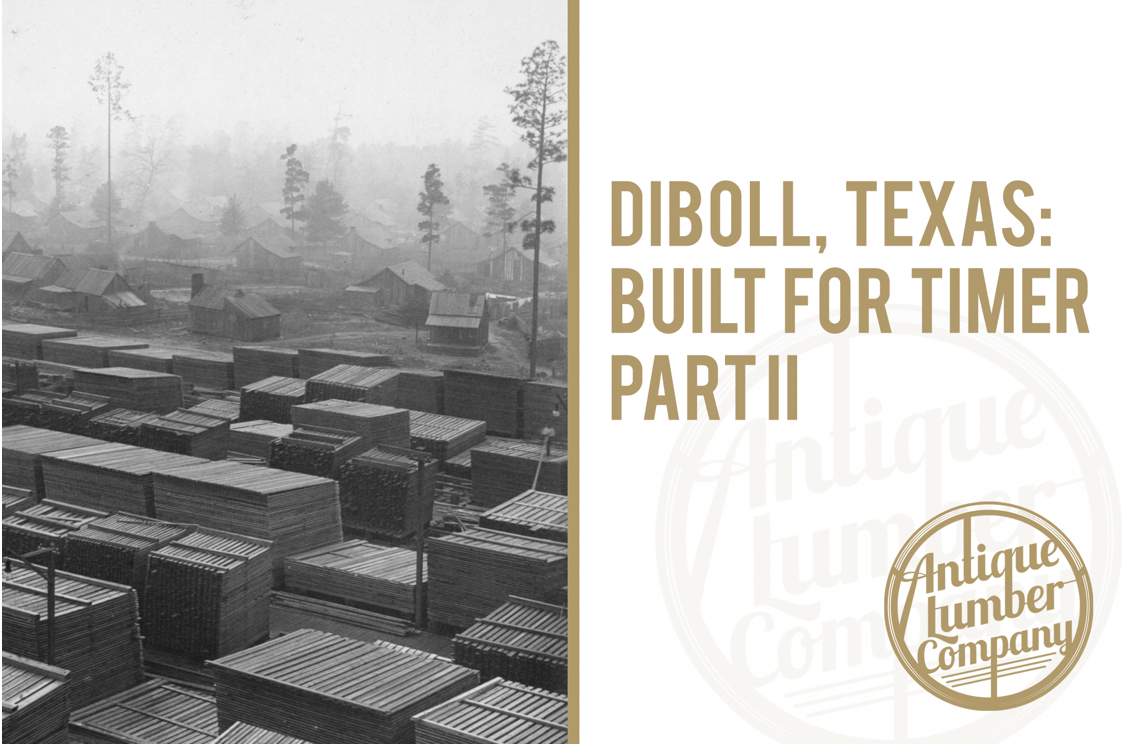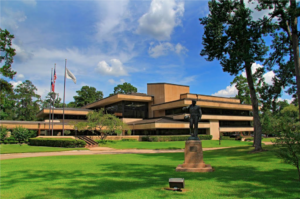
A Near-End and New Beginning
Decades of wealth and prosperity continued until the end of the 1920s. When the stock market crashed in 1929, even the most successful corporations struggled. Diboll was no exception. During the throes of the Great Depression, the mill was verging on bankruptcy as banks scrambled to call in debts. To float the Diboll operation, they liquidated 100,000 acres of forestland to the US Government. However, it was barely enough to sustain the company. Millworkers, eager to repay their loyalty, loaned their savings to the mill. Their efforts succeeded, and the Southern Pine Lumber Company remained mostly unscathed by the nation’s economic downturn.
In 1948, Arthur Temple, Jr., a grandson of Thomas Temple, became both manager and vice-president of the company. He injected fresh ideas into the operation with a futuristic mindset. He envisioned Diboll to be an incorporated, self-sustaining town. With this in mind, he instituted new programs and services that would ultimately give the people both resources and power to lead the town well into the future.
By 1951, changes were already underway. Temple began selling the company-owned homes to their occupants for very modest sums. He built a state-of-the-art medical clinic with an ambulance service, improved the town’s infrastructure, and built a new fire station. The old town commissary was replaced with a modern shopping center. A bank was built to service the resident’s needs and he invested heavily in improvements to the school. A public library was also built. By all accounts, Diboll was a thriving town complete with its own radio station. Temple’s aspirations came to fruition when the town elected their first mayor in 1962 after it was officially incorporated.
Diboll Today
With the town residents assuming control of Diboll in the 1960s, Southern Pine soon reorganized itself with a new focus in mind. The company consolidated a nearby mill in Pineland and began operating under the name of Temple Industries. This ushered in a new era for both the company and the town. The mill at Diboll began manufacturing a variety of pulp products like particleboard and gypsum wallboard.
Perhaps one of the most fascinating aspects of Diboll is its united spirit and loyalty to one another. The nation was gripped with tension and uncertainty with the Civil Rights Act of 1964. However, the town remained, for the most part, unphased by the surrounding chaos. White and African-American students merged with little incident. Town historians speculate that integrating the athletic program early on in the desegregation process likely contributed to the smooth transition. They also note that Diboll’s long history of being a company town also helped as everyone worked for the same company.
Technology has always propelled continued growth and development for Diboll. The 1970s and 1980s saw innovations in chemical engineering that allowed for the design of new paper and pulp products. Temple Industries and Diboll were ready to assume leadership in the production of these new products.
In 1973, Time Industries acquired Temple Industries to form Temple-Eastex. The new company, with its combined resources, now owned over one million acres of Texas forestland. With its nearly 5,000 employees, Temple-Eastex was a premier leader in the pulp and paperboard industries. In 1984, Temple-Eastex reorganized once again to create Temple-Inland. With an even deeper pocket of resources to pull from, the company did over $1billion in sales its first year in operation and became the nation’s top producer of corrugated boxes, building products, pulp, and paperboard. Its hub of operation remained in Diboll thus contributing to the economic development of the town even more.
In 2017, Georgia Pacific completed the acquisition of Temple-Inland. The sale took over 5 years to complete, but the lengthy transaction was worth it according to Georgia Pacific officials. Mark Luetters, executive vice-president, said he was excited to bring “high-quality assets with teams of talented employees” to the Georgia Pacific brand.
Today, Diboll continues to thrive with its small-town spirit and a billion-dollar industry. Community events such as Diboll Day, held every other year, has raised over $4 million dollars to fund projects like a public swimming pool, little league fields, library expansions, and facilities for the town’s youth and senior citizens.

Young ladies of Diboll participating in Diboll Days over the decades. The money raised from this event has provided community enrichment projects such as a community pool and senior citizen’s activity center.
The prosperity of Diboll is steeped in the foundations and beliefs laid out by Thomas L.L. Temple. His fundamental tenets were heavily rooted in the realization that the company and the town were interdependent on one another. Meaning, one can only be successful with the mutual partnership of the other. He also recognized that the welfare of each depends solely on the conservation of the forests. These foundations of the Temple family, the Southern Pine Lumber Company and the citizens of Diboll will surely carry the town to future success for decades to come.
Antique Lumber Company invites you to shop the finest selection of antique longleaf pine in Texas. Our warehouse is located just an hour north of the DFW Metroplex with, and we’ve recently added Saturday hours for your shopping convenience. When you’re looking to bring quality and history to your home or business’ construction project, look no further than longleaf pine and Antique Lumber Company!
We’re social! Be sure to follow us on Facebook, Twitter, and Instagram for all of our latest news and events.




No Comments